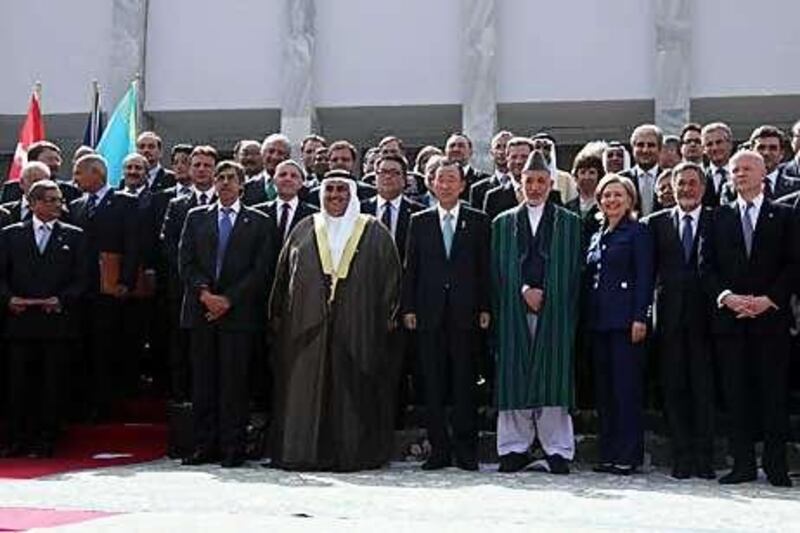KABUL // A major international conference in Kabul yesterday appeared to bring closer an end to the nine-year long US-led occupation, with moves confirmed for Afghan forces to take over the country's security in 2014. Occurring against the backdrop of rising nationwide violence and a growing sense that the Taliban are winning the war, the summit brought together diplomats and foreign ministers from across the world.
It was the largest meeting of its kind here for decades and much of the city was in lockdown as the officials came to show their support for a set of policies that had essentially been decided in advance. Ban Ki-moon, the UN secretary general, arrived at the event after his flight to Kabul was diverted following a Taliban rocket attack on the airport. No one is believed to have been hurt. Later, the final communiqué outlined a series of goals that both the government and the international community must try to achieve in a relatively short space of time. Failure to do so is likely to add to discontent at home and abroad.
The most notable of the targets is a gradual handover of security that could begin later this year and will be complete by the end of 2014. That framework for that had already been agreed at a lower-profile Nato gathering in Estonia in April, but yesterday it received the very public endorsement of the Afghan president, Hamid Karzai. After warning that "we face a vicious common enemy", he signalled what may come to be regarded as the beginning of the end of the US-led occupation.
"I remain determined that our Afghan national security forces will be responsible for all military and law enforcement operations throughout our country by 2014," he said. Among the attendees at the conference were the newly appointed head of US and Nato forces here, Gen David Petraeus, Hillary Clinton, the US secretary of state, and the British foreign minister, William Hague. The gradual handover of security has been described as conditions based, although it is unclear what criteria will be used to judge those conditions.
Anders Fogh Rasmussen, Nato secretary general, told delegates the war remained "a mission of necessity" and said it would only end when "the Afghans are able to maintain security on their own". Even then, international forces would have some kind of "supporting role". The US has insisted that progress is being made but civilian casualties have risen this year and foreign troops are also dying in record numbers. Meanwhile, a recent report by the Afghanistan NGO Safety Office showed there were 1,319 Taliban attacks in June, compared to 1093 at the peak of last year's violence.
On the streets of the capital yesterday there were mixed feelings about the 2014 deadline, which comes on the back of a drawdown in US forces that is due to start next summer. Mohammed Arif, aged 24, said he did "not believe in the conference because it is not in our hands" and was under the control of foreigners. However, he was worried about what will happen if international troops withdraw too soon. "Our country will be demolished," he said.
Also endorsed in principle at the summit was a plan to reintegrate insurgents who renounce ties to al Qaeda, respect the constitution and eschew violence. So far, the Taliban have rejected any overtures by the Afghan government, demanding an end to the occupation instead. Hakim Ullah, aged 37 and from the northern province of Badakhshan, said the rebels should be welcomed into the political fold. "The Taliban and the other groups who are fighting are all Afghans and they have the same rights as us. If there are negotiations with any group, it will be prosperous for Afghanistan," he said.
Security was not the only issue discussed yesterday. Participants agreed to channel at least 50 per cent of aid through the Karzai administration within two years, up from 20 per cent. And the Afghan government vowed to publish and verify the asset declarations for all senior officials and stressed the importance of holding credible parliamentary elections in September. In a sign of how accustomed to corruption society here has become, Noor Islam, a painter from Nangarhar province, said he would just be happy if even a fraction of donor money trickled down.
"For every $20,000 [Dh73,500] they steal, can they please spend $5,000 of it on ordinary people?" he implored. csands@thenational.ae






